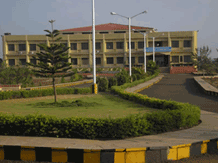![]()
KARNATAKA
VETERINARY ANIMAL
& FISHERIES SCIENCES UNIVERSITY, BIDAR
 The Government of Karnataka established the Karnataka Veterinary,
Animal and Fisheries Sciences University (KVAFSU) under the
Karnataka Act No 9 of 2004 on 28.2.2005 at Bidar as head quarters.
KVAFSU is offering B.V.Sc. & A.H. (Bachelors of Veterinary
Sciences & Animal Husbandry), B.F.Sc. (Bachelor of Fisheries
Science) and B. Tech (D.Tech) (Bachelor of Dairy Technology)
degree programmes. The post graduate degree programmes are offered
in Veterinary Sciences (M.V.Sc), Fishery Sciences (M.F.Sc) and
Dairy Sciences (M.Tech) along with the Doctoral degree programmes
(Ph.D) offered in Veterinary Sciences, Fishery Sciences and Dairy
Sciences. M.B.A is offered in Food and Dairy Business Management
under self finance mode. Since last year Diploma in Animal
Husbandry for SSLC pass students have been started at Konehally
and Haveri. At present the University has four constituent
Veterinary Colleges located at Bangalore, Bidar, Shimoga and
Hassan, College of Fisheries at Mangalore, two Dairy Science
Colleges at Bangalore and Mahagoan (Gulbarga Dist), two institutes
namely Institute of Animal Health and Veterinary Biologicals
(IAH&VB) at Bangalore and Institute of Wildlife Veterinary
Research at Doddalavar, three Livestock Research and Information
Centres at Hallikhed, Konnehally and Nagamangala, Canine Research
and Information Centre at Thimmapur and four Fisheries Research
and Information Centres at Ankola, Hebbal, Hesaraghatta and
Bhutnal. In addition to the above Veterinary Colleges at Gadag,
Athani and Puttur, Buffalo Research and Information Centre in
Dornalli and Institute of Toxicological Research at Shimoga are
yet to be established.
The Government of Karnataka established the Karnataka Veterinary,
Animal and Fisheries Sciences University (KVAFSU) under the
Karnataka Act No 9 of 2004 on 28.2.2005 at Bidar as head quarters.
KVAFSU is offering B.V.Sc. & A.H. (Bachelors of Veterinary
Sciences & Animal Husbandry), B.F.Sc. (Bachelor of Fisheries
Science) and B. Tech (D.Tech) (Bachelor of Dairy Technology)
degree programmes. The post graduate degree programmes are offered
in Veterinary Sciences (M.V.Sc), Fishery Sciences (M.F.Sc) and
Dairy Sciences (M.Tech) along with the Doctoral degree programmes
(Ph.D) offered in Veterinary Sciences, Fishery Sciences and Dairy
Sciences. M.B.A is offered in Food and Dairy Business Management
under self finance mode. Since last year Diploma in Animal
Husbandry for SSLC pass students have been started at Konehally
and Haveri. At present the University has four constituent
Veterinary Colleges located at Bangalore, Bidar, Shimoga and
Hassan, College of Fisheries at Mangalore, two Dairy Science
Colleges at Bangalore and Mahagoan (Gulbarga Dist), two institutes
namely Institute of Animal Health and Veterinary Biologicals
(IAH&VB) at Bangalore and Institute of Wildlife Veterinary
Research at Doddalavar, three Livestock Research and Information
Centres at Hallikhed, Konnehally and Nagamangala, Canine Research
and Information Centre at Thimmapur and four Fisheries Research
and Information Centres at Ankola, Hebbal, Hesaraghatta and
Bhutnal. In addition to the above Veterinary Colleges at Gadag,
Athani and Puttur, Buffalo Research and Information Centre in
Dornalli and Institute of Toxicological Research at Shimoga are
yet to be established.
At present, there are 1401 students on roll out of which 1192 are in Bachelor programme, 188 in Masters and 21 are in Ph.D. programmes. Among these 905 students are pursuing B.V.Sc. & A.H., 163 B.Tech. (D.Tech.) and 124 B.F.Sc. programmes. Over 100 students nominated by Indian Council of Agricultural Research (ICAR) and Veterinary Council of India (VCI) and 21 Foreign Nationals are also being imparted UG and PG education under this University. The University has MOU’s with renowned institutes of USA, France, China, Bangladesh, Belgium and Sweden. The total number of sanctioned posts is as follows: Key Officers 16, Teaching Staff 701 and non teaching staff 718. The University is operating research projects with the funding support from Government of Karnataka, DBT / ICAR, GOI and other agencies. The university has obtained patents in Novel Biofilm vaccines, Bio-control of luminous bacteria in shrimp hatcheries using bacteriophages, Oligonucleotide probe for detection and enumeration of Vibrio spp. in aquaculture systems. The technology generated includes development of AMUR strain of common carp, SWARNADHARA strain of chicken, Pathogenecity Test for Evaluation of Immune response to formalin inactivated cell culture based CSF vaccine in rabbits and Rapidot a monoclonal antibody based farmers kit for detection of white spot virus in shrimp culture.
Extension Research Priorities include participatory technology generation and management, transfer of technologies pertaining to organic animal husbandry including fisheries, enhancing the role of farmwomen in sustainable animal husbandry, dairying, poultry and fish production, strengthening the advanced trainings in frontier areas of animal husbandry and fisheries productivity. The University Library has a very good collection of books and journals. e-Resources centers have been established at Bidar and Bangalore campus libraries, which have access to thousands of online journals under CeRA of the ICAR. The libraries have subscribed CD-ROM and many Indian and foreign journals. More than 30 general magazines, news papers, news letters, annual reports, popular magazine and publications from SAUs, ICAR institutes and other Indian organization are available in all the libraries. The university library has a collection of over 31,000 books and subscribes to 27 foreign journals and 76 Indian journals every year.
The university libraries have built up over 19,611 back volumes so far.